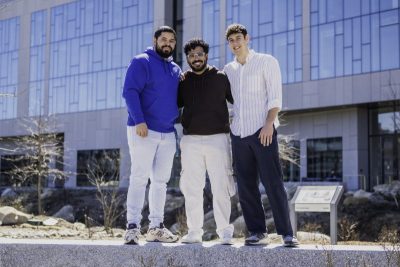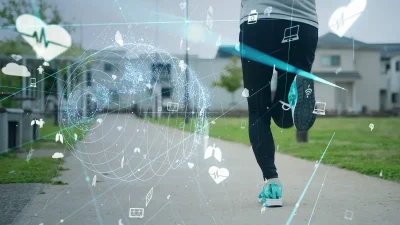
With Week 3 of CCEI’s Summer Fellowship already wrapped, we’re spotlighting another one of our ten startup teams: Toribio Labs. This startup is creating wearable, electronic devices for health monitoring and other applications.
CCEI’s Kate Savinelli was able to sit down with John Toribio, CEO of Toribio Labs.
—
Tell me initially how you came up with this idea. Take me all the way back to Day 1.
Technically Day 0 would be when I was contemplating coming to UConn for a PhD. I met my now research advisor, and I said I wanted to make something that could help my mom with her fibromyalgia. Something that can be wearable and give information to her. At the time, I felt the treatment she was trying was a lot of guessing and checking. There was no clear treatment for her, or for anyone with fibromyalgia.
[My research advisor] described the technology in making clothing that can monitor your body in a medically-relevant way.
It wasn’t until a year later that I started thinking about making it a business. I met my co-founders, Kyle Mahoney and Joshua Ross, in a course on ‘technology, innovation and entrepreneurship.’ When we first started working together, we clicked — I knew they would stick around. From then, it started off being more of a healthcare product. As we looked at who needed this product and where we could get into the market, we saw ‘athletics’ as the best place to start.
So it’s less about medical use now? Or is it still medically-focused?
Medical use is one of the end goals. But, there’s so much work that can be done before having to deal with the barriers of entry into the medical space. There’s a lot of people who would benefit from it, even if it’s not an official medical device, right?
Right, even if they don’t have a disease or condition.
Exactly. I think what it ended up broadening to is making something that can make it easier for everyone to be healthy. Especially when it comes to the kinds of food that are available for us to eat, or the amount of information/misinformation in the world. It’s very easy to get lost and confused about how to live a healthy lifestyle.
I see this not just with my mom, but with other family members and friends. Even with myself — I will read stuff online, but how do I know if it is true? How do I know if it is applicable to me? So, I’m creating something that is based on each person as an individual, rather than giving broad, general advice.
I love that. For somebody who is just meeting and learning about Toribio Labs for the first time, how would you describe it to them?
It’s smart clothing for health monitoring. The first question I’ll get is: “Okay, what about the risk-based trackers? Like Apple Watches or Fitbits?”
The most clear example is that I’m wearing a watch on my left arm, but it doesn’t know I’m moving my right arm. There’s a lot of things that these devices can’t pick up on because of their size and where they’re worn. But, if we can take advantage of a larger surface area over the body and start to measure things more directly — like how a doctor or primary care physician would measure them — it’ll give you more information.
Hopefully down the line, it will allow you to skip the step of having to take a warning first from your watch, and then go check your heart rate. We’re also looking at things like muscle activity and skin activity.
In describing the product, is it something that is in the clothes? Is it a device that is sewn in?
In terms of the products, it’s three components. There’s the clothing itself, which we print sensors onto. Then, a device attaches onto the shirt or pants, and that has the battery circuit to pick up the signal. Then, it sends information to an app on your phone, which is essentially the third product. That’s where you can see your data and share it with other people.
Has there been any obstacles that you guys have faced thus far? Anything that you had to figure out, shift or pivot from?
Initially, it was the fact that we saw this as being such a massive opportunity for everyone. But we can’t start marketing to everyone. We were trying to decide between healthcare, athletics, or defense. Who will our first customer be, and what value can we give them?
Another thing was the fact that the fundamental technology can be used for more than just health monitoring. So, we’re trying to be comfortable with starting in one realm — and then being excited about expanding into other types of wearable technologies in due time.
First, we wanted to do everything. Very quickly, we realized that’s not how it’s going to work out.

Of course, it gets exciting. Innovation can get really broad, really fast. What has been a goal that you’ve hit, or significant progress you look back on?
A couple of years ago, I was very technical about communicating and presenting the idea to other people. It took me a while to learn how to explain the value we’re providing, rather than the features we’re offering. Once I started to do that better, it was a lot more exciting. I communicate with people much better.
For the team, we’ve been feeding off of that. We’ve gotten a few grants and awards within UConn, and outside of UConn, including VentureWell awards. Those awards were important in showing us we were on the right path.
Also, we’ve done a lot of prototyping. With every iteration, it’s exciting seeing what improvements we made since the previous version. Even when we find something that might not have turned out as we wanted it to, it’s another problem to solve. It keeps us going.
Are there any accelerator programs, showcases, or pitch competitions you’ve done?
From CCEI, we got some seed funding from Get Seeded. We did the first round of that program and received an award, and also got an award at Demo Day. After that, I mentioned that we got a first stage award from VentureWell. That was a two-day workshop that came with $5,000 in non-diluted funding. A couple of days ago, I got an email saying we’ve been accepted for their second stage of $20,000.
We got also first place at UConn’s Innovation Quest. After that, we did their incubator program, which was helpful.
Obviously getting into CCEI’s Summer Fellowship was huge for us. It was something that we always saw as a goal down the line, but once we actually got here, it was really exciting.
You talked about your other team members. Do you have plans to hire more team members, or are you not there yet?
We definitely see some roles that we want to fill in down the line. We’d want to hire a software engineer. The app is going to be a huge component in the way we interact with customers and the way we provide value. As we start to get more funding, we’ll need a CFO. I’ve been managing the financial stuff, but I’m not the best person for it. We’ll also want to work with a fashion designer at some point. We’re making clothing, and ultimately we want it to be comfortable and appealing to everyone.
Tell me about other competitors you might have.
There’s a lot of competition out there when it comes to wearable fitness trackers. What I’m hoping to find is a place to complement those things. They’re not necessarily going to go away, but we can provide something they can’t — just because of the form factor of clothing. Wearing the sensors distributed across your body is going to give you different information and different types of insights.
Our value is in our materials and our technology, and making something that’s more comfortable for people to wear. And hopefully, more affordable. But time will tell with that one!
If someone would like to learn more, where should they go? Or, should they get in contact with?
We have a LinkedIn page for Toribio Labs. We also have a website: toribiolabs.com. It’s still under construction, but you’re able to type in your name and your email. It’ll notify us that you’re interested, or want to reach out.
Otherwise, people can email me directly at john.toribio@uconn.edu.